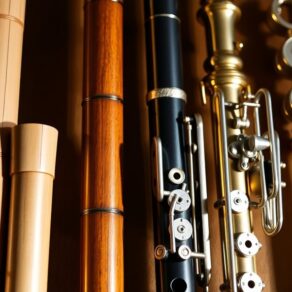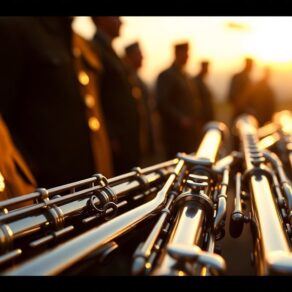Flutes have a profound impact in military bands, enhancing both the emotional and cultural dimensions of military life. They symbolize unity and resilience, offering troops comfort amidst chaos and fostering camaraderie through shared experiences. Their soothing melodies elevate morale, aiding soldiers in coping with the psychological demands of combat. Additionally, flutes play a pivotal role in military ceremonies, highlighting traditions and sacrifices while creating a unique auditory atmosphere. As part of marching bands, they enrich the overall sound, complementing brass and percussion. Understanding these dynamics reveals their deeper significance in the military context and broader cultural narratives.
Key Takeaways
- Flutes enhance the auditory experience in military bands, providing a unique timbre that complements brass and percussion instruments.
- Their melodies foster unity and camaraderie among troops, uplifting spirits during both peaceful and wartime moments.
- Flutes symbolize resilience and hope, serving as reminders of shared heritage and values in the face of conflict.
- The adaptability of flutes in military music traditions promotes emotional connections and teamwork among soldiers.
- Flute performances during ceremonies create an atmosphere of reflection and respect, reinforcing military values and traditions.
Historical Significance of Flutes
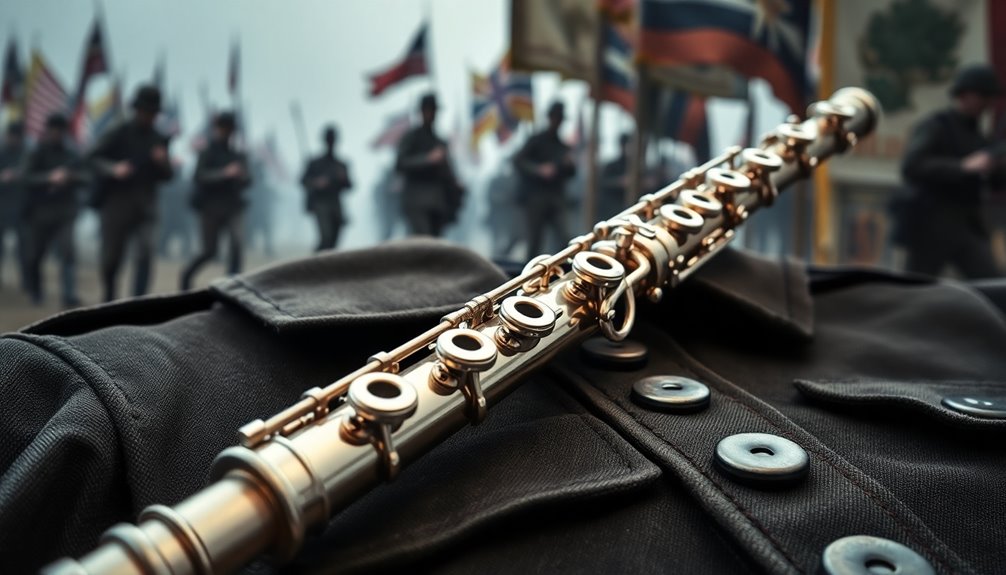
Although flutes may seem like a mere embellishment in military bands, their historical significance runs deeper than mere aesthetics. In ancient civilizations, flutes served not just as musical instruments but as crucial components of cultural expressions. They were often associated with rituals, celebrations, and even warfare, illustrating how music intertwined with societal values and practices.
You might be surprised to learn that flutes have been utilized since time immemorial, with archeological findings revealing their presence in various cultures, from the Egyptians to the Romans. These ancient artifacts suggest that flutes were more than entertainment; they played a role in unifying communities and enhancing the morale of soldiers. When you consider the psychological impact of music on troops, it becomes clear that the flute's melodic tones could evoke feelings of bravery and camaraderie essential for combat readiness.
Moreover, the use of flutes in military bands reflects broader cultural expressions. They symbolize resilience and hope, reminding soldiers of their heritage and shared identity. You might relate to this notion, as music often serves as a powerful connector among individuals, fostering a sense of belonging.
As military traditions evolved, flutes maintained their place, merging artistry with the gravity of duty. In essence, the historical significance of flutes lies not only in their sound but also in their capacity to articulate the human experience, bridging the past and present in the context of military and cultural narratives. Furthermore, the mastery of articulation techniques allows flutists to convey deeper emotional connections through their performances, enhancing the impact of their music in military settings.
Flutes in Military Ceremonies
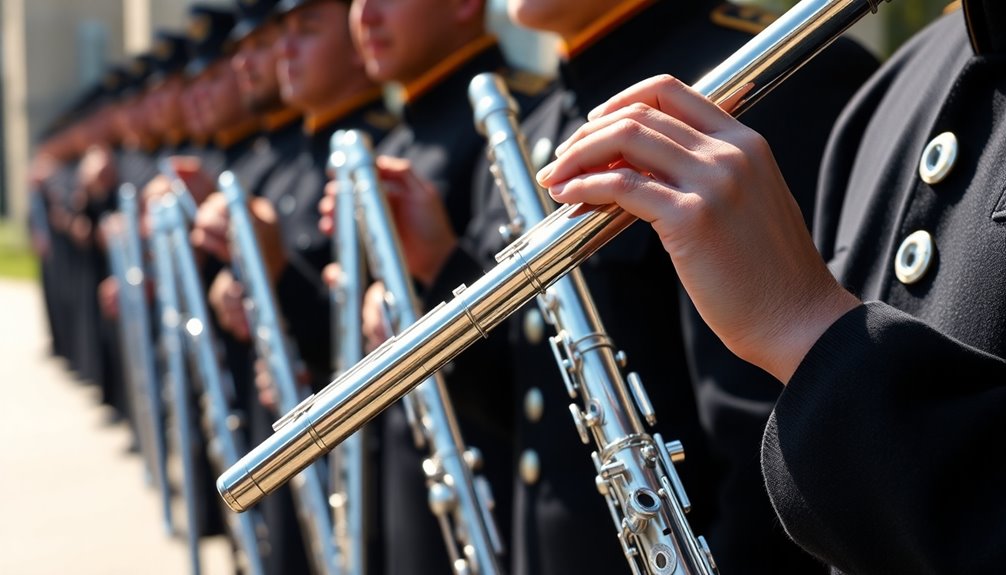
Flutes in Military Ceremonies
The role of flutes in military ceremonies highlights their function beyond mere musical accompaniment; they serve as a significant element in the ritualistic aspects of military life. Through the lens of ceremonial music, flutes create a unique atmosphere that fosters a sense of unity and belonging among participants and spectators alike. You might notice how the delicate tones of the flute can evoke strong emotions, transforming a simple event into a poignant tribute.
Flute traditions within military ceremonies often symbolize precision and grace. Their inclusion in events like change-of-command ceremonies or memorials reflects a deep respect for heritage and honor. When you hear the soft melodies, it's not just music; it's a reminder of the sacrifices made by service members and the continuity of military values. The sound of the flute can bridge generations, connecting the past with the present.
Moreover, the incorporation of flutes into military ceremonies often enhances the overall aesthetic experience. The juxtaposition of the flute's lightness against the robust sound of brass instruments creates a rich tapestry of sound that captivates audiences. You may find that this harmonious blend serves to elevate the solemnity of the occasion, imbuing it with a sense of dignity and reverence. The emphasis on breath control during performances ensures that the flutists deliver their melodies with clarity and emotional impact.
In essence, flutes in military ceremonies encapsulate a rich tradition that speaks to shared experiences and collective memory. Their melodic contributions help foster a deeper understanding of military life, reminding us all of the importance of community and remembrance.
The Role of Flutes in Marching Bands
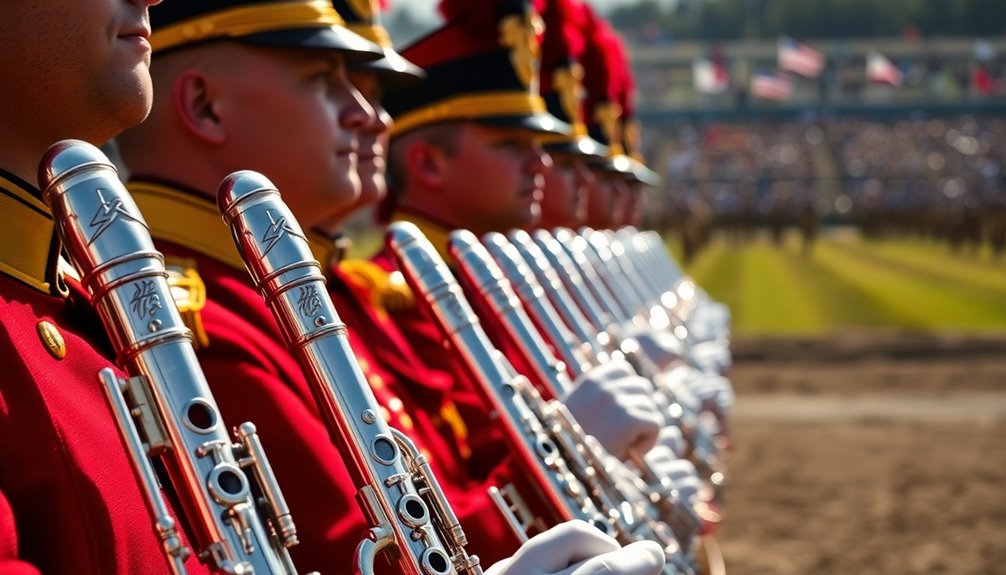
How do flutes contribute to the dynamic soundscape of marching bands? The role of flutes in these ensembles often goes unrecognized, yet their presence is essential. Flutes provide a unique timbre that complements the powerful brass and percussion, creating a balanced auditory experience. Their bright, clear tones cut through the ensemble, enhancing the melodic lines and driving the rhythm.
Incorporating effective marching techniques, flutists must synchronize their movements with precision while maintaining musicality. This dual focus on performance and technique fosters a sense of unity within the band. As you march in formation, the flutes help establish a cohesive sound that elevates the overall performance.
Their agility in executing intricate flute compositions adds an exciting layer to the band's repertoire, enchanting audiences and enhancing the visual spectacle of the performance.
Furthermore, the versatility of the flute allows for a range of expressions, from delicate, soaring melodies to more robust, rhythmic passages. This adaptability makes flutes essential in both the melodic and harmonic structures of marching band music. By blending seamlessly with other instruments, flutes create a fuller, richer sound that resonates on the field.
In essence, flutes play a vital role in shaping the identity of marching bands. Their contributions not only enrich the musical landscape but also foster a sense of belonging among musicians and audiences alike. As you embrace these roles, you become part of a tradition that values both artistry and teamwork. Additionally, investing in innovative cleaning tools ensures that flutes remain in optimal condition, allowing for consistent performance quality throughout the season.
Symbolism of Flutes in Warfare
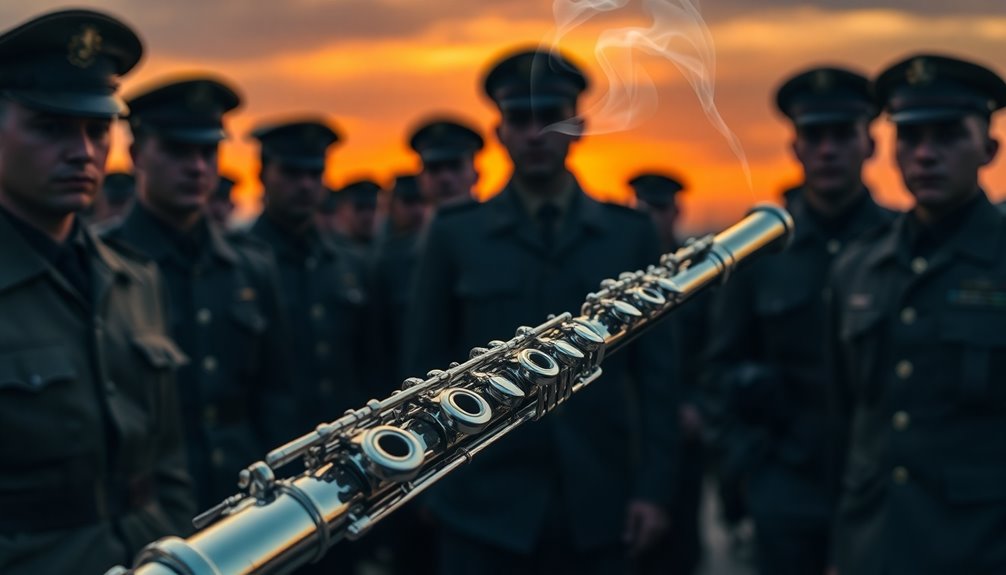
Flutes have long held a unique place in the context of warfare, symbolizing both communication and camaraderie among troops. When you think about military settings, the presence of flutes evokes a sense of unity that transcends spoken language. This instrument serves as a powerful tool for musical communication, allowing soldiers to convey messages and coordinate actions in a way that commands attention and fosters cooperation.
Cultural symbolism plays an important role in understanding the flute's significance in warfare. Across various cultures, the flute often represents peace, harmony, and the human spirit, which contrasts sharply with the brutal realities of battle. This duality makes the flute an indispensable element in military bands, as it offers a moment of introspection amid chaos.
When troops hear the lilting tones of a flute, it can remind them of their shared humanity, reinforcing bonds that are essential for survival and morale. Moreover, the flute's melodic qualities can uplift the spirits of soldiers, creating an atmosphere where camaraderie thrives. In moments of conflict, these sounds often serve to remind you and your comrades of the values you're fighting for—community, loyalty, and hope. The versatility of the flute allows it to adapt to various musical styles, enhancing its role in military music traditions that promote unity and resilience.
Fundamentally, the flute embodies not just the sounds of war, but also the deeper cultural narratives surrounding it. Consequently, its symbolism in warfare remains a potent reminder of the balance between conflict and the enduring connections forged among those who serve together.
The Impact of Flutes on Morale
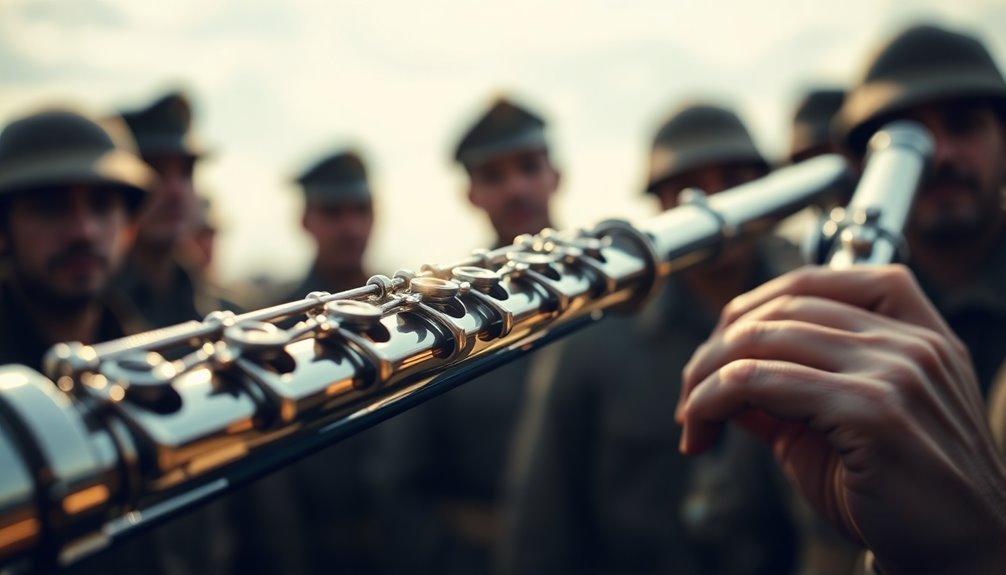
Amidst the chaos of battle, the sound of a flute can greatly elevate troop morale. This subtle yet powerful instrument possesses a unique ability to cut through the din of warfare, offering a moment of emotional resonance that soldiers desperately crave. When you consider the psychological demands of combat, the soothing flute melodies serve not just as a backdrop but as a lifeline, fostering camaraderie and shared experience among troops.
Research underscores that music, particularly in high-stress environments, activates emotional responses that can dramatically impact morale. The lilting tones of a flute can evoke feelings of nostalgia, hope, and unity, reminding soldiers of their shared purpose and humanity. When you hear those melodies rising above the battlefield, they create a sense of belonging that transcends individual fears and anxieties.
Furthermore, the use of flute music in military bands has historical roots, where it often accompanied significant events or rituals, reinforcing bonds within units. In moments of despair, these melodies remind soldiers of home and peace, providing a stark contrast to the brutality surrounding them. You might find that when troops gather to listen, they not only reconnect with their own emotions but also with each other, forming a collective strength.
Moreover, the emotional and interpretative aspects of flute music can enhance the camaraderie among troops, allowing for deeper connections through shared musical experiences.
Ultimately, the flute's role in military settings illustrates how music can serve as a tool for resilience, allowing individuals to confront their reality while fostering a sense of unity that's essential for enduring the trials of war.
Frequently Asked Questions
What Materials Are Commonly Used to Make Military Flutes?
When you explore the materials used in military flutes, you'll find two primary types: wooden flutes and metal flutes.
Wooden flutes, often crafted from hardwoods like grenadilla or maple, offer a warm, rich tone, making them popular for their expressive sound.
On the other hand, metal flutes, typically made of silver or nickel, produce a brighter, more penetrating sound, ideal for outdoor performances.
Each material serves a unique purpose in military musical traditions.
How Have Flute Designs Evolved Over Time?
Flute designs have evolved considerably over time, reflecting historical innovations and modern adaptations.
You'll notice that early flutes were typically simpler in construction, often made from wood, while contemporary designs incorporate advanced materials like metal, enhancing durability and sound quality.
The addition of keys transformed playability, allowing for greater range and expression.
This evolution showcases an ongoing dialogue between tradition and innovation, inviting you to explore the rich history and future possibilities of this instrument.
Are There Famous Flutists Known for Military Performances?
Imagine a soldier standing tall, a flute in hand, bridging the gap between chaos and harmony.
You might be surprised to learn that famous flutists like Jean-Pierre Rampal and James Galway have showcased their talents in military performances.
They've demonstrated how music can uplift spirits and foster unity, even amidst turmoil.
These artists highlight the flute's unique ability to convey emotion, proving that even in war, there's room for beauty and connection.
How Do Flutes Compare to Other Instruments in Military Bands?
When you compare flutes to other instruments in military bands, you'll notice their unique versatility.
Flutes contribute to military harmony by adding a bright, melodic layer that enhances the overall sound. Unlike heavier brass or percussion instruments, flutes can shift effortlessly between commanding presence and delicate passages, making them essential for conveying emotion and precision.
This adaptability allows military bands to create a rich, cohesive sound that resonates with both tradition and modernity.
What Are the Challenges of Playing Flutes in Outdoor Settings?
Playing the flute outdoors can feel like trying to shout in a hurricane! Weather conditions, like wind and rain, can wreak havoc on your sound projection.
You'll find it challenging to project your notes clearly against nature's roar. Plus, fluctuating temperatures can affect your instrument's tuning and your breath control.
Adapting your technique is essential, requiring you to remain focused and resilient, ensuring your music resonates despite the chaotic environment around you.
Conclusion
In examining the role of flutes in both war and peace, you can see how this instrument transcends mere sound. It's not just about music; it's about unity and morale. When flutes play, they weave a thread through history, connecting soldiers and civilians alike. As they say, music soothes the savage beast, and in the chaos of conflict, flutes provide a sense of calm and camaraderie, reminding us of the humanity that persists even in the darkest times.

